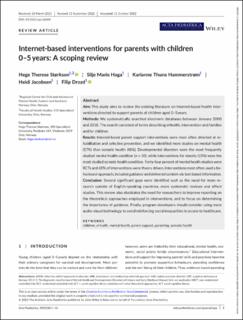| dc.contributor.author | Størksen, Hege Therese | |
| dc.contributor.author | Haga, Silje Marie | |
| dc.contributor.author | Nilsen, Karianne Hammerstrøm | |
| dc.contributor.author | Jacobsen, Heidi | |
| dc.contributor.author | Drozd, Filip | |
| dc.date.accessioned | 2023-01-20T07:29:47Z | |
| dc.date.available | 2023-01-20T07:29:47Z | |
| dc.date.created | 2022-10-25T07:45:32Z | |
| dc.date.issued | 2022 | |
| dc.identifier.citation | Acta Paediatrica. 2022, 1-14 | en_US |
| dc.identifier.issn | 0803-5253 | |
| dc.identifier.uri | https://hdl.handle.net/11250/3044758 | |
| dc.description | This is an open access article under the terms of the Creative Commons Attribution-NonCommercial License, which permits use, distribution and reproduction in any medium, provided the original work is properly cited and is not used for commercial purposes. | en_US |
| dc.description.abstract | Aim: This study aims to review the existing literature on Internet-based health interventions directed to support parents of children aged 0–5 years.
Methods: We systematically searched electronic databases between January 2000 and 2018. The search consisted of terms describing eHealth, intervention and families and/or children.
Results: Internet-based parent support interventions were most often directed at rehabilitation and selective prevention, and we identified more studies on mental health (57%) than somatic health (41%). Developmental disorders were the most frequently studied mental health condition (n = 33), while interventions for obesity (15%) were the most studied somatic health condition. Forty-four percent of mental health studies were RCTs and 65% of interventions were theory driven. Interventions most often used a behavioural approach, included guidance and delivered content via text-based information.
Conclusion: Several significant gaps were identified such as the need for more research outside of English-speaking countries, more systematic reviews and effect studies. This review also elucidates the need for researchers to improve reporting on the theoretical approaches employed in interventions, and to focus on determining the importance of guidance. Finally, program developers should consider using more audio-visual technology to avoid reinforcing social inequalities in access to healthcare. | en_US |
| dc.language.iso | eng | en_US |
| dc.publisher | Wiley | en_US |
| dc.relation.uri | https://doi.org/10.1111/apa.16569 | |
| dc.rights | Navngivelse-Ikkekommersiell 4.0 Internasjonal | * |
| dc.rights.uri | http://creativecommons.org/licenses/by-nc/4.0/deed.no | * |
| dc.subject | somatic health | en_US |
| dc.subject | parenting | en_US |
| dc.subject | parent support | en_US |
| dc.subject | mental health | en_US |
| dc.subject | eHealth | en_US |
| dc.subject | children | en_US |
| dc.title | Internet-based interventions for parents with children 0–5 years: A scoping review | en_US |
| dc.type | Peer reviewed | en_US |
| dc.type | Journal article | en_US |
| dc.description.version | publishedVersion | en_US |
| dc.rights.holder | © 2022 The Authors. Acta Paediatrica published by John Wiley & Sons Ltd on behalf of Foundation Acta Paediatrica. | en_US |
| dc.source.pagenumber | 1-14 | en_US |
| dc.source.journal | Acta Paediatrica | en_US |
| dc.identifier.doi | 10.1111/apa.16569 | |
| dc.identifier.cristin | 2064684 | |
| dc.relation.project | Stiftelsen Dam: 353518 | en_US |
| cristin.ispublished | true | |
| cristin.fulltext | original | |
| cristin.qualitycode | 1 | |

